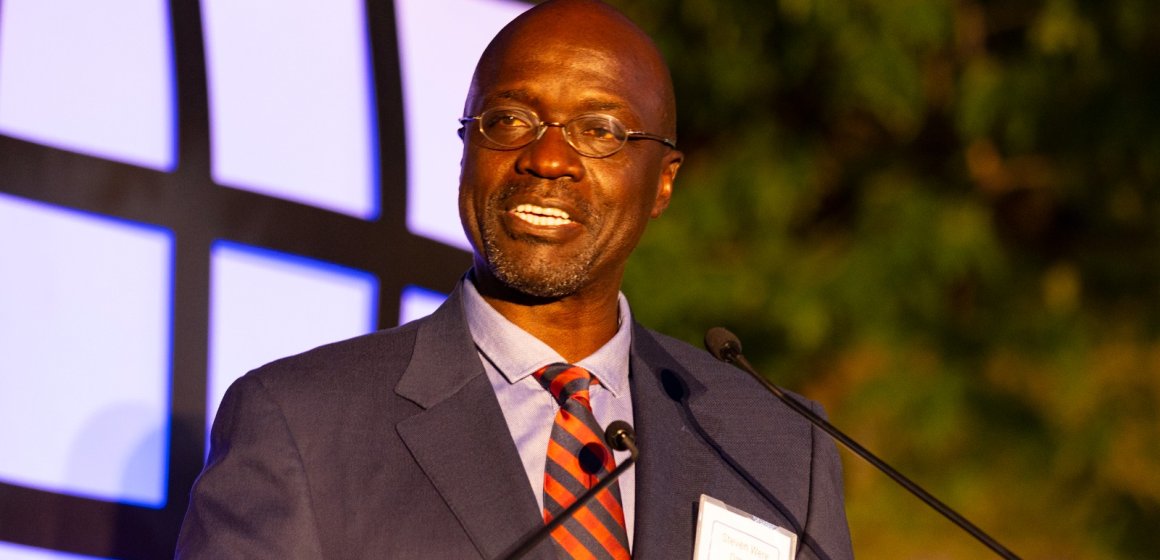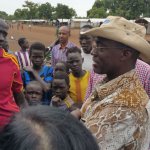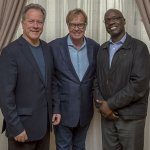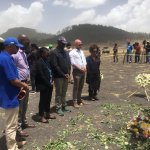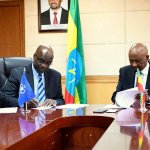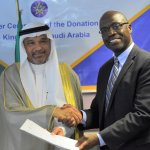Father, Son, Husband, Researcher, Innovator, Scientist, Leader, Diplomat, Author, Educator, and Humanitarian are just a few titles that describe Dr. Steven Were Omamo, The Africana Voice Person of the Year.
The Kenyan native is the CEO of New Growth International (NGI), a management consulting firm he co-founded in 2007 with his wife, Cheryl. NGI advises and educates clients in the agrifood and education industries, helping them to find innovative solutions and improve performance in their fields.
He is the former United Nations’ World Food Programme (WFP) Country Representative in Ethiopia and a world-renowned agrifood expert and he is part of the 2020 WFP team that won the Nobel Prize, a major accomplishment for the humanitarian organization that feeds millions of people facing starvation in unglamorous conflict and hardship zones.
Omamo is an author of numerous peer-reviewed scholarly work and research papers on agriculture and agrifood industry and several books, including The Men Do Not Eat Wings.
Having served served in senior positions in diplomatic and global humanitarian circles, the totality of his body of work makes him arguably one of the world’s most accomplished Africans.
His latest best-selling book, At the Center of The World In Ethiopia, is a template of how intellectual Africans should respond when subjected to racist and hostile work environments.
A man of calm, intelligent demeanor, Omamo uses diplomatic language in criticizing the WFP management. The sharp diplomatic criticism is an act of rare bravery seen among African professionals who often opt to suffer in silence, leaving in place systemic racism to disseminate other Africans serving in racist organizations.
ALSO READ: Rampant Racism in WFP and UN Bodies According to Survey.
He exposes the corruption within the UN-WFP and racist practices that disenfranchise African professionals. Omamo gives a candid account of his successes and challenges in the WFP and working with the United Nations.
Omamo was in charge of WFP operations in Ethiopia when the war in the Northern part of Ethiopia broke out. He recounts several incidents where both sides of the conflict treated him with suspicion, blaming him for being sympathetic to the other side.
The book’s candor is a fitting tribute to 14 WFP colleagues who died in the field doing humanitarian work in some of the most desolate parts of the world.
Omamo’s sharp diplomatic criticism of WFP leadership is an act of rare bravery seen among African professionals who often opt to suffer in silence, leaving in place systemic racism to disseminate other Africans serving in racist organizations.
He recounts the 2019 tragedy of the Ethiopian Airlines ET 302 crash, which crashed minutes after takeoff from Addis Ababa for Nairobi, killing all 157 people on board, including 8 WFP employees.
In 2022, Omamo was named Distinguished Alumnus by the Jordan College of Agricultural Science and Technology for his global humanitarian work, earning him the Top Dog Alumni Award, the highest honor granted by Fresno State University, California.
Fresno State also started a scholarship in Omamo’s name, a rare honor bestowed upon a non-American.
Omamo holds a master’s degree in agricultural economics from the University of Connecticut. And a second master’s degree in international development policy and a Ph.D. in agricultural economics from Stanford University.
He has written several books and numerous policy, academic, and research papers on agrifood and food security and is recognized as a global leader in the field.
Omamo joined WFP in 2006, serving as its chief of social protection and livelihoods. His tenure with WFP lasted for 12 years playing various roles, including head of food security, deputy director of policy planning and strategy, coordinator of food systems strategy, and deputy director of policy and programme.
His big promotion on the global stage came in 2018 when he was named WFP’s representative and country director in Ethiopia, a tenure that lasted until 2021.
The three years as the WFP leader in Ethiopia were a big test. He managed through multiple crises, which he summarized in his latest book.
“The three years that followed would feature a major convulsion after another due to drought, flooding, inter-ethnic conflict, massive internal displacement, desert locust invasions, COVID-19, and civil war in Northern Ethiopia,” Omamo wrote in his book. “Seldom would one disruption appear in isolation. They came in twos, threes, and even fours.”
The first son of Kenya’s cabinet minister, the Late Dr. William Odongo Omamo, and mother, Joyce Achola Omamo, the younger Omamo, told Fresno State News that his father inspired him to serve the public and work in the agricultural field.
“My father used to say, ‘you eat your sweat,’ and that mentality fueled him to expand his operations and achieve great things,” Were said. “From him (and my mother’s example), I learned to focus and work extra hard beginning in elementary school. Education didn’t come easy to me at that point, but they stressed the benefits of a good education and doing well.”
Despite coming from a high-profile political family, Omamo chose the unglamorous path to be a humanitarian and serve the poor. In Ethiopia, a nation he says he fell in love with, Omamo found everything he could think of, from wealth to poverty, in large portion servings.
As the CEO of NGI, Omamo has created systems to help clients solve agrifood and education system problems. In the agrifood pillar, NGI
Under the education pillar, NGI provides curriculum, institutional, professional, policy, strategy, and programme evaluations, including workshop planning and facilitation.
Omamo’s work at NGI has attracted international clients, including the World Bank and AGRA among other prominent organizations.
With multiple international recognition for his expertise, it’s puzzling why a man of Omamo’s stellar resume and accomplishments is not sought after by the Kenyan government or the African Union to help formulate agricultural policies that meet global standards.
Naming Omamo The Africana Voice Person of The Year is therefore not just a testament to his curriculum vitae but rather an admonition to Africa for failing to recognize the much-needed exceptional talent and putting them to the work of building the continent.
But despite his accomplishments, he still finds time to relax and have fun. During his youth, he enjoyed playing rugby and represented Kenya at schoolboy and senior levels, but nowadays, he spends his downtime riding motorbikes.
Dr. Omamo was a guest in our Twitter Spaces on November 8, 2022. Here’s the recording of our conversation with him regarding his book and the transformation of Ethiopia.
Twitter Spaces on Tuesday Nov 8
10 am | 9pm EAT
Topic: Focus on Crisis and Transformation in EthiopiaSpeaker: @swomamo Dr. Steven Were Omamo, CEO NGI, Former WFP Director in Ethiopia | Nobel Prize 2020. Author: At The Center Of The World in Ethiopia.https://t.co/gYGe7cVBSb
— Maurice Ndole (@MauriceNdole) November 4, 2022
